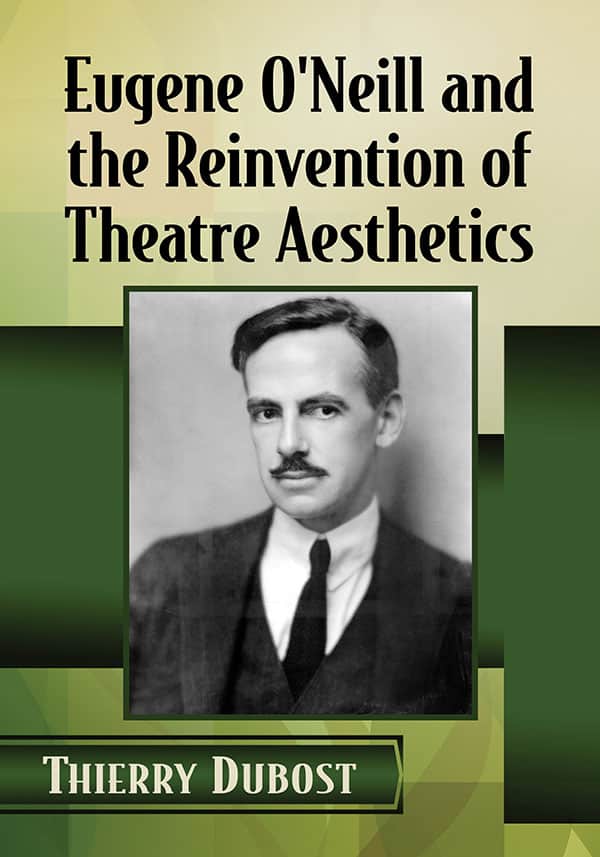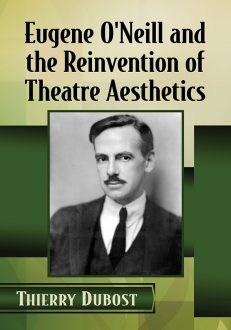Eugene O’Neill and the Reinvention of Theatre Aesthetics
Original price was: $49.95.$24.99Current price is: $24.99.
In stock
About the Book
The plays of Eugene O’Neill testify to his continued search for new dramatic strategies. The author explores the Nobel Prize winner’s attempts at creating a new Modern play. He shows how, moving away from melodrama or “the problem play,” O’Neill revisited the classical frames of drama and reinvented theater aesthetics by resorting to masks, the chorus, acoustics, silence or immobility for the creation of his dramatic works.
About the Author(s)
Bibliographic Details
Thierry Dubost
Format: softcover (7 x 10)
Pages: 277
Bibliographic Info: notes, bibliography, index
Copyright Date: 2019
pISBN: 978-1-4766-7728-6
eISBN: 978-1-4766-3568-2
Imprint: McFarland
Table of Contents
Acknowledgments v
List of Abbreviations ix
Introduction 1
1. Aristotle Got His Gun: From A Wife for a Life, Now I Ask You! […] to A Touch of the Poet 7
2. Thirst: A Theatrical Appetizer 14
3. Human and Aesthetic Migrations in Fog 22
4. Bound East for Cardiff, an Immobile Crossing 28
5. The Movie Man: The Failure of Aesthetics? 35
6. Servitude: Portrait of the Artist as a Committed Playwright 42
7. Before Breakfast: An Overemphasized Monologue? 48
8. Exorcism: The Road Not Taken 53
9. “Harmless Foights” in the Sea Plays 60
10. Home, Elsewhere: Tragic (Im)mobility in Beyond the Horizon 68
11. Madness in Where the Cross Is Made and Gold 76
12. A Long, Long Kiss: Labial Contacts in The Straw, Diff’rent,
The First Man, The Fountain and Welded 82
13. The Aesthetics of (Fake) Salvation in “Anna Christie” 89
14. The Emperor Jones: Inventing a New Dramaturgy 96
15. The Hairy Ape: An Orphean Journey into Thought 106
16. A Playwright-Director Staging The Rime of the Ancient Mariner 115
17. A Thing Is Not Just a Thing: An Uncanny Stage Presence in All God’s Chillun Got Wings 123
18. Opaque or Transparent Representations of Desire in Desire Under the Elms 131
19. Home Away from Home: Greed in Marco Millions 140
20. The Great God Brown: Shedding Old-Fashioned Staging Models? 148
21. Lazarus Laughed and Dynamo: Nonverbal Communications 156
22. Strange Interlude: Exposing the Invisible 163
23. The Ways of the Flesh in Mourning Becomes Electra 170
24. A Kierkegaardian Comedy: The Painless Contradictions of a Festive Meal in Ah, Wilderness! 176
25. Days Without End: A Modern Miracle Play? 184
26. The Origin of a World: Male Privacy and Tragedy in A Touch of the Poet 191
27. A Garden of One’s Own: Heterotopia in More Stately Mansions 199
28. O’Neill’s Choric Designs in The Iceman Cometh 206
29. Long Day’s Journey into Night: Words for the Birth of a Ghostly Irish Playwright 216
30. Hughie, Written More to Be Read Than Staged? 222
31. The Road to Salvation in A Moon for the Misbegotten 229
Conclusion 236
Chapter Notes 239
Bibliography 258
Index 265
Book Reviews & Awards
• “A worthy sequel to Thierry Dubost’s first book on O’Neill…. Dubost’s finest insight in this excellent book is his tracing of the development of O’Neill’s ideas about the tragedy of the inevitable human experience of elusiveness and loss—of the inability to sustain a sense of fulfillment and belonging…This book makes it easy to see how O’Neill set the thematic direction for much of later American drama, especially the plays of Edward Albee and Sam Shepard, and the ease with which theatre could move from O’Neill’s vision of tragedy to Beckett’s vision of the absurd.”—The Eugene O’Neill Review
• “Each chapter of Dubost’s book, spanning O’Neill’s entire canon, bursts with unexpected and resonant insights on the playwright’s evolving aesthetic and dramaturgy that reflect the very quality Dubost argues defines O’Neill’s brilliance and stature—innovative.”—Steven F. Bloom, author of The Student Companion to Eugene O’Neill and Chairman of the Board of Directors, The Eugene O’Neill Society< • “Dubost analyzes O’Neill’s progression as a playwright from his early one-act plays to A Moon for the Misbegotten in the most comprehensive study since Travis Bogard’s Contour in Time.”— Zander Brietzke, author of The Aesthetics of Failure: Dynamic Structure in the Plays of Eugene O’Neill





